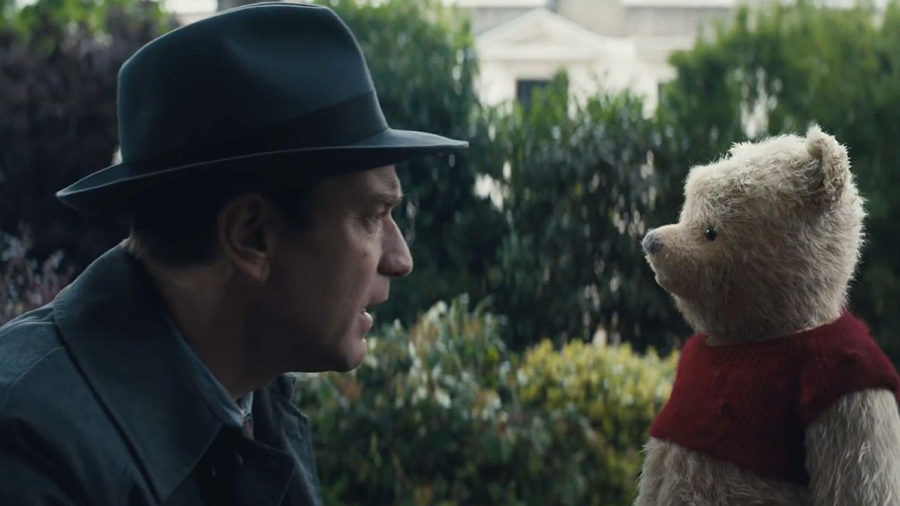‘Christopher Robin’ is unoriginal but uplifting
Ewan McGregor plays Christopher Robin and Tim Cummings is the voice for Winnie the Pooh in the family-friendly film released Aug. 3. (Photo via TNS/Disney)
August 20, 2018
When Christopher Robin asked Pooh to be a less “exuberant” version of himself in the recently released film “Christopher Robin,” the fuzzy, honey-loving childhood icon responded by pronouncing the word as “Ex-Pooh-Berant.”
That is just the word to describe how “Christopher Robin” made me feel — “Ex-Pooh-Berant.”
The drama-fantasy is based off of A. A. Milne’s tales of the teddy bear Winnie-the-Pooh, directed by Marc Forster and accompanied by aesthetically pleasing cinematography created by Alex Ross Perry, Tom McCarthy and Allison Schroeder. It is integrated with deep life lessons and themes that create the feeling of going through a personal journey of healing, all while Tigger excitedly bounces about.
The movie starts out with a young Christopher Robin — played by Orton O’Brien — saying his goodbyes to those he got to know over the years in the Hundred Acre Wood as he is setting out to boarding school. The opening scene concludes with teary goodbyes and promises that he will never forget them — not even when he’s a hundred.
The lovable characters make “Christopher Robin” a sincere childhood tribute, however it still doesn’t appeal to all demographics. The storybook visuals before Christopher Robin leaves for boarding school paint out quintessential scenes mixed in with live action, which may capture the attention of young viewers — at first.
Though the movie is rated PG, the slow-paced start and multi-faceted plot takes away from its intended family adventure genre.
Prior to Christopher Robin’s midlife crisis, the audience both sees and feels the happiness and childish freedom fade out of his life as he is slapped for drawing at school and later loses his father. He also misses the birth of his daughter while fighting in World War II as a young man.
The movie then fast forwards to a middle-aged Christopher Robin — played by Ewan McGregor — living in 1950s London with his daughter, Madeline, played by Bronte Carmichael, and his wife, the architect Evelyn, played by Hayley Atwell.
The movie is a victim of the exhausted cliche of a child who once was playful but ends up growing up to be a middle-aged workaholic who has little time for his family. The hero’s relationship with his family is already in turmoil as the luggage company he works at is shown in economic crisis. He is clearly unhappy.
Christopher Robin is then given the decision to either spend the weekend in Sussex with his family or stay at home to come up with a solution that will ultimately prevent his department from being laid off.
It’s shortly after that when, running into a nearby garden to avoid a trying neighbor (this, at least, is relatable for all ages), he is reunited with his childhood best friend, Pooh, who had ventured out of the Hundred Acre Wood after losing his friends.
However, Christopher Robin has no time for Pooh, and decides that his only solution is to rush Pooh back to the Hundred Acre Wood before his important meeting on Monday. The rest of the story unfolds as Christopher Robin is reunited with all of his childhood friends, and learns to relive his childhood fantasies of friendship and courage to ultimately bring life back to the Hundred Acre Woods.
The faded animals also exchange fast-paced scenes with Madeline and Evelyn. Through these scenes, the movie does a nice job balancing out “laugh out loud” moments with life lessons. The pure comments made by Pooh and friends along with their worn-out figures will leave movie goers both tearing up and smiling.
The magic-like cinematography is topped off by seamlessly pairing the animation with spot-on voice actors, which include Jim Cummings, Nick Mohammed, Brad Garrett, Peter Capaldi, Toby Jones and Sophie Okonedo.
“Christopher Robin” is a somewhat slow yet still heartwarming, beautiful and eye-opening continuation of Milne’s stories, reminding older viewers what is truly important in life — family. The journey of Christopher Robin recovering the happiness that was once distilled in his childhood shows audiences how “Doing nothing often leads to the very best kind of something.”



